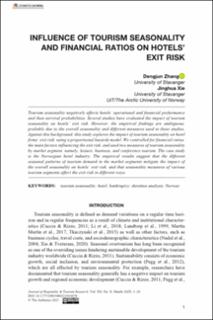Influence of Tourism Seasonality and Financial Ratios on Hotels’ Exit Risk
Peer reviewed, Journal article
Published version
Permanent lenke
https://hdl.handle.net/11250/2829438Utgivelsesdato
2021-05Metadata
Vis full innførselSamlinger
Originalversjon
Zhang, D., Xie, J. (2021) Influence of Tourism Seasonality and Financial Ratios on Hotels’ Exit Risk. Journal of Hospitality & Tourism Research 10.1177/10963480211016038Sammendrag
Tourism seasonality negatively affects hotels’ operational and financial performance and then survival probabilities. Several studies have evaluated the impact of tourism seasonality on hotels’ exit risk. However, the empirical findings are ambiguous, probably due to the overall seasonality and different measures used in these studies. Against this background, this study explores the impact of tourism seasonality on hotel firms’ exit risk, using a proportional hazards model. We controlled for financial ratios, the main factors influencing the exit risk, and used two measures of tourism seasonality by market segment, namely, leisure, business, and conference tourism. The case study is the Norwegian hotel industry. The empirical results suggest that the different seasonal patterns of tourism demand in the market segments mitigate the impact of the overall seasonality on hotels’ exit risk, and that seasonality measures of various tourism segments affect the exit risk in different ways.

